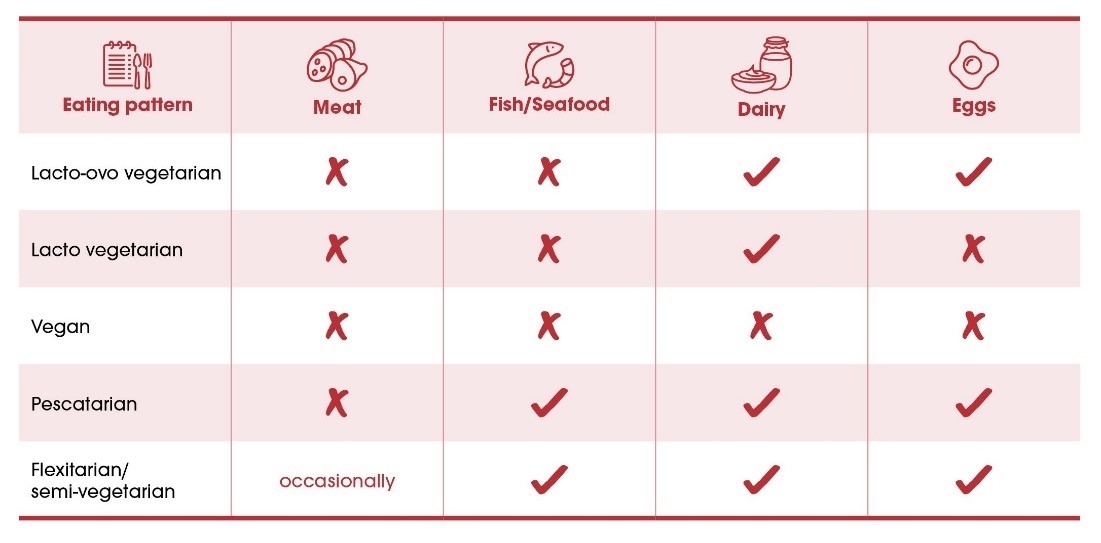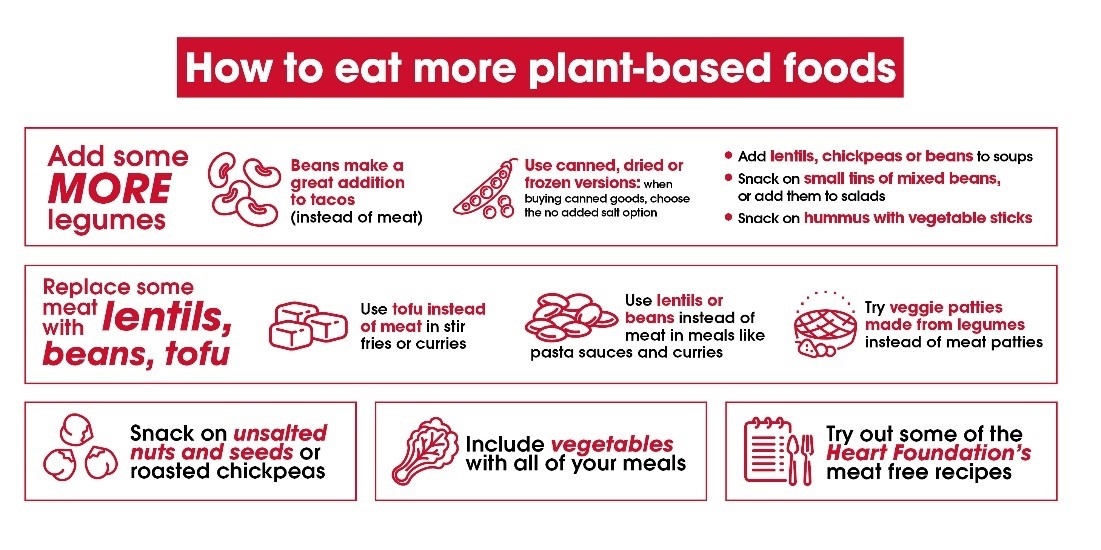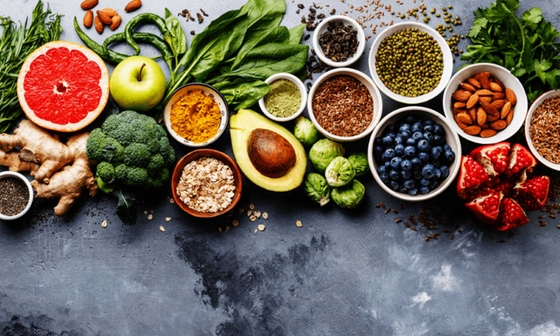
What is plant-based eating
Learn about plant-based eating and its impact on heart health
Key takeaways
- Plant-based eating includes a range of eating patterns from eating no animal products to including small-to-moderate amounts of animal products.
- Our Heart Healthy Eating Pattern includes mostly plant-based foods.
- Eating more plant-based foods, like fruit, vegetables and wholegrains is good for heart health, but you don’t need to follow a vegan or vegetarian eating pattern.
Plant-based eating is a broad term that covers a range of eating patterns, from vegan (not eating or drinking any animal products) to including small to moderate amounts of animal-based products in your diet.
- Plant-based eating means most of the foods you eat are from plant sources, such as fruits, vegetables, wholegrains, seeds, nuts, legumes, beans and oils.
- This eating pattern may include small amounts of animal products, such as meat, fish/seafood, eggs and dairy.
- Plant -based can also describe food or drinks that don’t contain animal products, including soy milk and ‘meat alternatives’ (usually made from soy, textured vegetable protein, or wheat gluten).
Are all plant-based foods healthy?
Not all plant-based foods are good for you: some have added salt, sugar or fat. These foods shouldn’t be considered healthy, simply because they are marketed as ‘plant-based’ (for example, some junk foods or desserts).
Understanding plant-based, vegetarian and vegan eating
There are a range of plant-based eating patterns, including:

What foods should I eat?
The Heart Foundation recommends that people follow our Heart Healthy Eating Pattern, which is built on eating plant-based foods. This pattern can be adapted, using the tips below, to suit your choices to eat, or not to eat, animal products. The plant-based foods in our Heart Healthy Eating Pattern are highlighted in bold.
For better heart health, we recommend that you follow a Heart Healthy Eating Pattern which includes:
- Plenty of vegetables, fruits and wholegrains
- A variety of healthy protein sources, especially fish and seafood, legumes (such as beans and lentils), nuts and seeds. Smaller amounts of eggs and lean poultry can also be included in a heart healthy diet. If choosing red meat, make sure the meat is lean and limit to 1-3 times a week.
- Unflavoured milk, yoghurt and cheese
- Healthy fat choices with nuts, seeds, avocados, olives and their oils for cooking
- Herbs and spices to flavour foods, instead of adding salt
Drinking water is great for your overall health, and it should be your drink of choice.
Learn more about our Heart Healthy Eating Pattern
Should I go vegetarian or vegan?
Eating more plant-based foods like fruit, vegetables, legumes, nuts, seeds and wholegrains is good for heart health. However, when it comes to a healthy heart, you don’t need to eat a strictly vegan or vegetarian diet.
What does the evidence show?
Studies show that eating more plant-based proteins (like legumes, nuts and seeds) can support better heart health. There is also evidence that replacing some (but not necessarily all) animal-based protein with plant-based protein is good for your heart.
However, there is not enough evidence to recommend removing all animal products from a healthy eating pattern. Specifically, eating foods like fish and seafood has been found to lower your risk of heart disease. There are also foods like eggs, white meat and milk/yoghurt/cheese, which have been shown to have a ‘neutral’ relationship with heart disease; eating these foods doesn’t significantly increase or decrease your risk.
One food that can increase your risk of heart disease is red meat. Studies show that eating too much red meat moderately increases your risk of heart disease. The Heart Foundation recommends eating no more than 350g (cooked) of unprocessed lean red meat each week, across 1-3 meals. We also recommend avoiding processed meat (like sausages, bacon, ham and other deli meats); these meats can be high in salt and are linked to heart disease.
There are many reasons why people choose not to eat animal products. These can include animal welfare; impact on the environment; and cultural, religious or other personal beliefs. You can choose if you want to eat animal-based products. Our Heart Healthy Eating Pattern recommendations can be adapted to support your choices to consume or avoid animal products.
While there are arguments for and against vegetarian, vegan and plant-based diets, it’s important to remember that you can boost your health by:
Eating more plant-based foods like fruit, vegetables, legumes, wholegrains, nuts and seeds
Eating less discretionary foods (both plant-based and animal-based). Discretionary foods include sweet biscuits, cakes, desserts, pastries and sugary drinks. These foods are not needed as part of a healthy eating pattern and are often high in saturated fats and/or added sugars. Discretionary foods can also contain high levels of added salt. They are also low in fibre.
If you follow a vegan or vegetarian eating pattern, speak with your health professional to make sure you are getting all the nutrients your body needs.
Are meat-free / plant-based meats healthier?
You can find many meat substitutes or plant-based meats in supermarkets. Like most food products, some are healthier than others. Many of these products (like meat free sausages, burgers, bacon etc.) are highly processed and can have a lot of salt (sodium). Eating too much salt can lead to high blood pressure, which is a risk factor for developing heart disease.
If you choose to eat these products, make sure you read the label and, where possible, choose options with fewer ingredients and lower levels of salt.
What about plant-based milks?
You can choose from a range of plant-based milk alternatives, such as soy milk, almond milk, oat milk and rice milk. If you choose one of these plant-based alternatives, make sure you pick a product with no added sugar. It’s also a good idea to look out for a calcium fortified option.
Last updated15 August 2025


